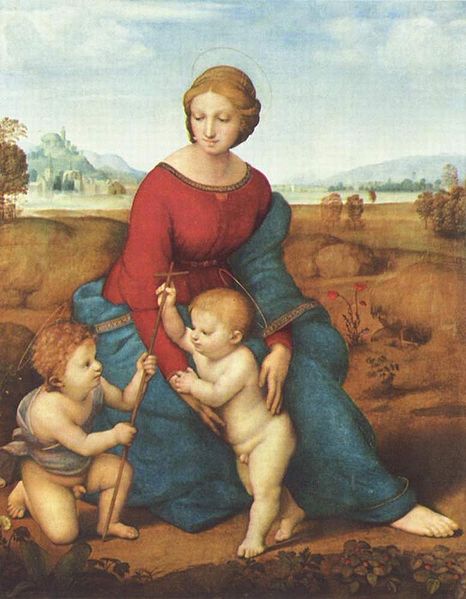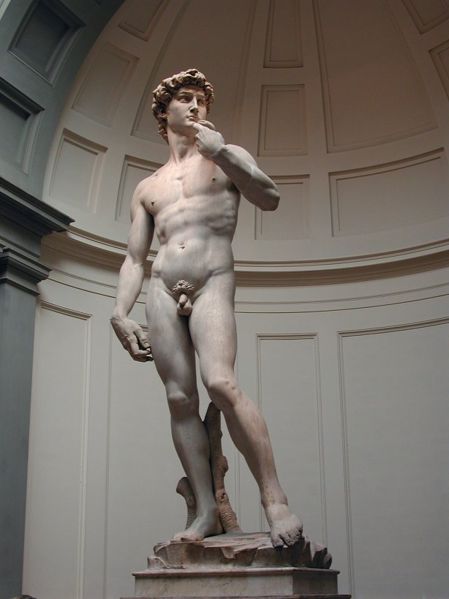文 化
從活樹到衣服 從永生到換洗

Last Judgement
With His lady Vittoria Colonna,
His first epistle to Vittoria is as follows: " I desired, lady, before I accepted the things which your ladyship has often expressed the will to give me — I desired to produce some-thing for you with my own hand, in order to be as little as possible unworthy of this kindness. I have now come to recognize that the grace of God is not to be bought, and that to keep it waiting is a grievous sin. Therefore I acknowledge my error, and willingly accept your favors. When I possess them, not indeed because I shall have them in my house, but for that I myself shall dwell in them, the place will seem to encircle me with Paradise. For which felicity I shall remain ever more obliged to your ladyship than I am already, if that is possible.
" The bearer of this letter will be Urbino, who lives in my service. Your ladyship may inform him when you would like me to come and see the head you promised to show me."
The letter was accompanied by this son-net:
" Seeking at least to be not all unfit
For thy sublime and boundless courtesy,
My lowly thoughts at first were fain to try
What they could yield for grace so infinite.
But now I know my unassisted wit
Is all too weak to make me soar so high,
For pardon, lady, for this fault I cry,
And wiser still I grow, remembering it.
Yea, well I see what folly 'twere to think
That largess dropped from thee like dews from heaven
Could e're be paid by work so frail as mine !
To nothingness my art and talent sink ;
He fails who from his mortal stores bath given
A thousandfold to match one gift divine."
Here is a translation, by Symonds, who also translated those sonnets by the master which are here quoted, of a letter which Vittoria Colonna sent to Michael Angelo from Viterbo:
"MAGNIFICENT MESSER MICHELANGELO.
-I did not reply earlier to your letter, because it was, as one might say, an answer to my last ; for I thought that if you and I were to go on writing without intermission according to my obligation and your courtesy, I should have to neglect the Chapel of S. Catherine here, and be absent at the appointed hours for company with my sister-hood, while you would have to leave the Chapel of S. Paul, and be absent from morning through the day from your sweet usual colloquy with painted forms, the which with their natural accents do not speak to you less clearly than the living persons round me speak to me. Thus we should both of us fail in our duty, I to the brides, you to the vicar of Christ. For these reasons, inasmuch as I am well assured of our steadfast friendship and firm affection, bound by knots of Christian kindness, I do not think it necessary to obtain the proof of your good will in letters by writing on my side, but rather to await with well-prepared mind some substantial occasion for serving you. Mean-while I address my prayers to that Lord of whom you spoke to me with so fervent and humble a heart, when I left Rome, that when I return thither I may find you with his image renewed and enlivened by true faith in your soul, in like measure as you have painted it with perfect art in my Samaritan. Believe me to remain always yours and your Urbino's."
The friendship between these two noble souls came to an end, as far as death can end such things, in 1547, when Vittoria Colonna passed from earth.
" All my friends are dead ; And she is dead, the noblest of them all.
I saw her face, when the great Sculptor Death, Whom men should call Divine, had at a blow Stricken her into marble ; and I kissed Her cold white hand."'
' Longfellow's "Michael Angelo."
Vittoria Colonna had been at rest seven-teen years when the end of a long life and of many colossal labors came to Buonarroti.
"Who shall doubt that these two have walked much together since, in that heaven where, they neither marry nor are given in marriage ? ' "

(Painting: Portrait of Pope Julius II by Raphael)
Pope Julius II
http://en.wikipedia.org/wiki/Pope_Julius_II (c. 5 December 1443 – 21 February 1513), nicknamed "The Terrible Pope" (Il Papa Terribile)[1] and "The Warrior Pope" (Il Papa Guerriero),[2] was born Giuliano della Rovere. He was Pope from 1503 to 1513. His reign was marked by an aggressive foreign policy, ambitious building projects, and patronage for the arts.
and
http://en.wikipedia.org/wiki/Holy_Roman_Emperors#List_of_Emperors
Holy Roman Emperor

The School of Athens (邏輯思想的苦悶和征戰) by Raphael
http://en.wikipedia.org/wiki/Raphael 以畫地上的人物, 尤其是 沉思中的年長者見長。把當時流行描繪的聖經中人物, 用色彩在外麵做包裹, 水份吸去, 變成不透明石膏式的, 或者隻能半透明式的人物, 象在下麵這一幅聖母,聖子及小天使的畫兒中,

Size of this preview: 466 × 599 pixels
The Madonna of the Meadow, ca. 1506, using Leonardo's pyramidal composition for subjects of the Holy Family.[27]
http://en.wikipedia.org/wiki/File:Raffael_030.jpg
盡管對於老年人不但在形體動態上, 甚至對於外觀表情都可以表達得相當細微。

而 Michael Angelo 卻能夠由一塊 Marble 石, 打磨出一位透明, 閃亮, 神采飛揚, 健美有力, 機智勇敢又無畏的牧羊少年, 後來的 King David.
1 Samuel 17:54-56
54 David took the Philistine's head and brought it to Jerusalem, and he put the Philistine's weapons in his own tent.
55 As Saul watched David going out to meet the Philistine, he said to Abner, commander of the army, "Abner, whose son is that young man?"
Abner replied, "As surely as you live, O king, I don't know."
56 The king said, "Find out whose son this young man is."
大衛到達兵營 | |||
| 12 | 大衛是猶大伯利恒的以法他人耶西的兒子;耶西有八個兒子。在掃羅的日子,耶西已經年紀老邁了。 | ||
| 13 | 耶西的三個大兒子跟隨了掃羅去作戰。去了作戰的這三個兒子的名字是:長子以利押、次子亞比拿達、三子沙瑪。 | ||
| 14 | 大衛是最小的,那三個年長的都跟隨掃羅去了。 | ||
| 15 | 大衛有時離開掃羅,回到伯利恒牧放他父親的羊群。 | ||
| 16 | 那非利士人每天早晚都近前來,站著罵陣,一連有四十天之久。 | ||
| 17 | 有一天,耶西對他的兒子大衛說:“你拿這十公斤烘了的穀子和這十個餅去給你的哥哥們;你要跑到營裏去給你的哥哥們, | ||
| 18 | 又拿這十塊乳酪去給他們的千夫長,看看你的哥哥們平安不平安,把他們的家書帶回來。” | ||
| 19 | 掃羅和大衛的哥哥們,以及以色列眾人都在以拉穀與非利士人作戰。 | ||
| 20 | 大衛清早起來,把羊群托給一個看守的人,就照著耶西所吩咐他的,帶著食物去了。他來到軍營中的時候,軍隊正出去列陣,吶喊助陣。 | ||
| 21 | 以色列人和非利士人都擺列陣勢,互相對峙。 | ||
| 22 | 大衛把身上的東西留在看守物件的人手中,跑到戰陣上去,向他的哥哥們問安。 | ||
| 23 | 大衛正與他們說話的時候,那個討戰的人,就是迦特的非利士人,名叫歌利亞,從非利士人陣中上來;他說的又是同樣的那些話,大衛都聽見了。 | ||
| 24 | 所有的以色列人一看見那人,就都從他麵前逃跑,非常害怕。 | ||
| 25 | 以色列人彼此說:“這個上來的人你們看見了嗎?他上來是要向以色列人罵陣的。如果有人能擊殺他,王必賞賜他大財富,把自己的女兒給他作妻子,並且使他的父家在以色列中免納稅,免服役。” | ||
| 26 | 大衛問站在他旁邊的人說:“如果有人擊殺這個非利士人,除去以色列人的恥辱,那人會得到怎麽的對待呢?這未受割禮的非利士人是誰呢?竟敢向永活的 神的軍隊罵陣?” | ||
| 27 | 於是眾民用以上的那些話回答他說:“如果有人能擊殺他,那人必得這樣的對待。” | ||
| 28 | 大衛與那些人說話的時候,他的大哥以利押聽見了,就向大衛發怒,說:“你為什麽下這裏來呢?在曠野的那幾隻羊你托了給誰呢?我知道你的驕傲和你心裏的惡意。你下來是要看打仗。” | ||
| 29 | 大衛說:“我現在作了什麽事呢?不是隻說了一句話嗎?” | ||
| 30 | 大衛離開他的哥哥,轉向另一個人,問同樣的問題。眾民還是用先前的話回答他。 | ||
| 大衛自願出戰 | |||
| 31 | 有人聽見大衛所說的這些話,就告訴掃羅;掃羅就派人去把大衛接來。 | ||
| 32 | 大衛對掃羅說:“大家都不要因這非利士人喪膽,你的仆人要去與這非利士人決鬥。” | ||
| 33 | 掃羅對大衛說:“你不能去與這非利士人決鬥,因為你年紀還輕,那人從小就作戰士。” | ||
| 34 | 大衛對掃羅說:“你仆人是為父親放羊的,有時獅子或熊來了,從羊群中抓去一隻小羊, | ||
| 35 | 我就出去追趕它,擊打它,從它的嘴裏把小羊救出來。如果它起來攻擊我,我就揪住它的胡須,擊打它,把它殺死。 | ||
| 36 | 你仆人不但擊殺過獅子,也擊殺過熊。這個未受割禮的非利士人也必像一隻獅子或熊一樣,因為他向永活的 神的軍隊罵陣。” | ||
| 37 | 大衛又說:“那曾救我脫離獅爪和熊掌的耶和華,也必救我脫離這非利士人的手。”於是掃羅對大衛說:“你去吧!願耶和華與你同在。” | ||
| 38 | 掃羅把自己的戰袍給大衛穿上,把銅盔戴在他的頭上,又給他穿上鎧甲。 | ||
| 39 | 大衛把刀佩帶在戰袍上。因為他以前沒有穿過,現在試著走一下。大衛對掃羅說:“穿戴著這些東西,我不能走動,因為我從前沒有穿過。”大衛就把這些裝備從身上脫下來。 | ||
| 40 | 他手中拿著自己的杖,又從溪裏挑選了五塊光滑的石子,放在口袋裏,就是牧人用的那種袋子,手裏又拿著甩石的機弦,就向那非利士人走近去。 | ||
| 大衛擊殺歌利亞 | |||
| 41 | 那非利士人也向著大衛慢慢走過來,拿大盾牌的人在他前麵走。 | ||
| 42 | 那非利士人觀看,看見了大衛,就藐視他,因為他年紀還輕,麵色紅潤,外貌英俊。 | ||
| 43 | 那非利士人對大衛說:“難道我是一條狗嗎?你竟拿杖來攻擊我。”於是指著自己的神咒詛大衛。 | ||
| 44 | 那非利士人又對大衛說:“你到我這裏來吧!我要把你的肉給空中的飛鳥和田野的走獸吃。” | ||
| 45 | 大衛回答那非利士人:“你來攻擊我是靠刀、靠槍,但我來攻擊你是靠萬軍之耶和華的名;萬軍之耶和華就是你所辱罵的以色列軍隊的 神。 | ||
| 46 | 今天耶和華要把你交在我手裏,我必擊殺你,砍下你的頭。今天我還要把非利士人軍隊的屍體給空中的飛鳥和地上的野獸吃。這樣,全地的人就都知道以色列中有一位 神。 | ||
| 47 | 也使這些人群都知道,耶和華拯救人不是靠刀,不是靠槍,因為戰爭的勝敗在於耶和華,他必把你們交在我們的手裏。” | ||
| 48 | 那非利士人起身,迎著大衛慢慢走過來;大衛也趕快往陣上跑去,迎戰那非利士人。 | ||
| 49 | 大衛伸手入口袋裏,從裏麵拿出了一塊石子來,用機弦甩去,擊中了那非利士人的前額;石子穿入前額裏麵,他就仆倒,麵伏於地。 | ||
| 50 | 這樣,大衛用機弦和一塊石子勝過了那非利士人。大衛擊殺了那非利士人,但他手中沒有刀。 | ||
| 51 | 大衛跑過去,站在那非利士人的身邊,拿起他的刀來,把刀從鞘中拔出來,殺死他,又用刀砍下他的頭。非利士人看見他們的勇士死了,就都逃跑。 | ||
| 52 | 以色列人和猶大人就起來,高聲吶喊,追趕非利士人,直到迦特的入口和以革倫的城門。被刺死的非利士人都倒在沙拉音的路上,直到迦特和以革倫。 | ||
| 53 | 以色列人窮追非利士人回來以後,就搶掠他們的營房。 | ||
| 54 | 大衛拿起那非利士人的頭,把它帶到耶路撒冷去,卻把那人的武器放在自己的帳棚裏。 | ||
| 掃羅召見大衛 | |||
| 55 | 掃羅看見大衛出去迎戰那非利士人,就問元帥押尼珥:“押尼珥啊,這個年輕人是誰的兒子?”押尼珥回答:“我敢指著王起誓,我不知道。” | ||
| 56 | 王說:“你去問問這個少年是誰的兒子。” | ||
| 57 | 大衛擊殺了那非利士人回來的時候,押尼珥迎接他,把他帶到掃羅麵前,大衛手中還拿著那非利士人的頭。 | ||
| 58 | 掃羅問他:“年輕人啊,你是誰的兒子?”大衛回答:“我是你仆人伯利恒人耶西的兒子。” | ||




